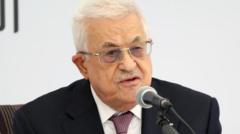Will the US Block Palestinians from Attending the UN Meeting in New York?

Published: 2025-08-29 16:54:04 | Category: world
This article explores the recent decision by the US to deny or revoke visas for Palestinian officials intending to attend the upcoming UN General Assembly session in New York. The move, which is unprecedented given the US's role as the host nation, has sparked significant debate regarding the implications for international diplomacy and the ongoing Israel-Palestine conflict.
Last updated: 03 October 2023 (BST)
Key Takeaways
- The US plans to deny or revoke visas for Palestinian officials attending the UN General Assembly.
- Secretary of State Marco Rubio cited terrorism and unilateral recognition efforts as reasons for the ban.
- The Palestinian Authority and Hamas have distinct governance roles in the territories.
- International recognition of Palestine is gaining momentum, with several countries planning to support it at the UN.
- Palestinian statehood remains contentious, with ongoing territorial disputes affecting recognition efforts.
The Context of the Visa Denial
The announcement by the US government to deny or revoke visas for Palestinian officials is a significant shift in diplomatic practice. Traditionally, host nations are expected to facilitate the travel of representatives from all UN member states. This decision aligns with Secretary of State Marco Rubio's stance that the Palestinian leadership has failed to meet necessary conditions for peace, particularly regarding terrorism and incitement.
Rubio’s statement indicates a hardening of the US position on Palestinian diplomacy. He emphasises that before the Palestine Liberation Organisation (PLO) and the Palestinian Authority (PA) can engage as peace partners, they must unequivocally reject terrorism and cease pursuing legal actions against Israel in international courts.
Historical Background
The Israel-Palestine conflict has persisted for decades, with various attempts at peace negotiations yielding limited success. The two-state solution has long been considered the preferred resolution, proposing the establishment of an independent Palestinian state alongside Israel. However, Israeli Prime Minister Benjamin Netanyahu has expressed strong opposition to this framework, asserting that recognising a Palestinian state would reward what he describes as "Hamas's monstrous terrorism."
Since the Hamas-led attack on southern Israel on 7 October 2023, which resulted in approximately 1,200 deaths, tensions have escalated dramatically. In response, Israel's military launched operations in Gaza, leading to a tragic death toll exceeding 63,000 according to the Hamas-run health ministry. This cycle of violence complicates the already fraught relationship between the Palestinian authorities and Israel.
International Responses and Recognition Efforts
While the US has taken a firm stance against Palestinian participation in the UN sessions, other nations, including France, the UK, Canada, and Australia, are moving towards recognising Palestinian statehood. This shift highlights a growing international consensus around the need to acknowledge Palestine as a legitimate state, despite the complexities on the ground.
The state of Palestine currently enjoys recognition from 147 of the 193 UN member states. However, without defined borders and amid the expansion of Israeli settlements in the West Bank—considered illegal under international law—actual changes resulting from such recognition may be limited.
The Role of the Palestinian Authority and Hamas
The governance of Palestinian territories is divided between Hamas and Fatah, with the latter leading the PA. This division has resulted in distinct political agendas, complicating the overall Palestinian position in international diplomacy. President Mahmoud Abbas oversees both the PA and the PLO, which has held observer status at the UN since 1974, allowing it to participate in discussions without voting rights.
Rubio's remarks also reflect a broader US policy that insists on a fundamental change in the Palestinian leadership's approach to governance and negotiations. The emphasis on repudiating terrorism and incitement is consistent with US laws regarding foreign assistance and diplomatic engagement.
The Legal Implications of the Visa Ban
The legal ramifications of the US decision remain somewhat ambiguous. The UN Headquarters Agreement stipulates that foreign officials' attendance at the UN should not be obstructed by the US, regardless of the diplomatic relations in place. This raises questions about the legality of denying visas to Palestinian officials and whether such actions might contravene international agreements.
As the UN General Assembly session approaches, the implications of the US's stance may reverberate through international diplomatic circles, potentially affecting how other nations approach their relations with both Israel and Palestine.
Future Considerations
The ongoing developments in the Israel-Palestine conflict, particularly in light of the recent violence and geopolitical shifts, will likely shape the discourse at the upcoming UN General Assembly. The focus on Palestinian statehood is set against a backdrop of continued hostilities and a fractured political landscape. It remains unclear how these dynamics will influence future peace negotiations or the broader quest for a two-state solution.
As nations reconsider their positions on Palestinian recognition, the potential for both diplomatic breakthroughs and further conflict remains significant. The actions taken at the UN may serve as a litmus test for international sentiment regarding the Israeli occupation and Palestinian rights.
Conclusion
The US's unprecedented decision to deny or revoke visas for Palestinian officials signals a distinct shift in diplomatic relations, reflecting a more hardline approach towards Palestine. With several countries supporting the recognition of a Palestinian state at the UN, the international community must navigate a complex landscape shaped by historical grievances, ongoing violence, and the quest for peace. The question remains: will this latest diplomatic manoeuvre hinder or help the prospects for a lasting resolution to the Israel-Palestine conflict?
FAQs
Why has the US denied visas to Palestinian officials?
The US has denied visas based on Secretary of State Marco Rubio's assertion that Palestinian authorities must renounce terrorism and cease actions against Israel at international courts before being considered partners in peace.
What is the current status of Palestinian statehood recognition?
As of now, 147 of the 193 UN member states recognise the state of Palestine, although significant challenges remain regarding its borders and governance due to ongoing Israeli settlements and conflict.
What does the UN Headquarters Agreement state about foreign officials attending meetings?
The UN Headquarters Agreement stipulates that attendance of foreign officials should not be impeded by the US, regardless of the diplomatic relations between their governments and the US.
How has the recent violence affected the Israel-Palestine conflict?
The violence that erupted following the Hamas-led attack in October 2023 has escalated tensions significantly, leading to a high death toll and complicating the already delicate dynamics of peace negotiations.
What role does the Palestinian Authority play in international discussions?
The Palestinian Authority, led by President Mahmoud Abbas, represents Palestinians in international fora and is responsible for governance in the West Bank, while Hamas controls the Gaza Strip. This division complicates Palestinian diplomacy.
#Palestine #UNGeneralAssembly #InternationalRelations



